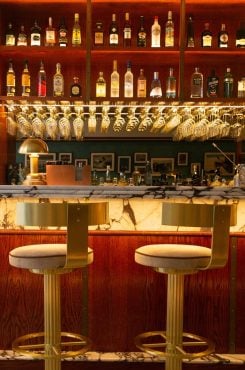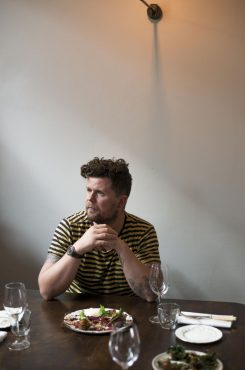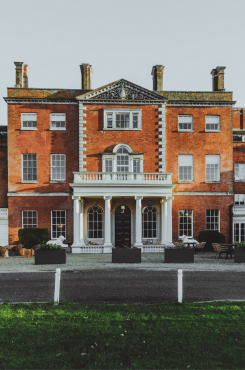

One of the hospitality industry’s most popular figures is Robin Gill, chef patron of The Dairy, Sorella, Counter Culture, Darby’s and – as of this month – all food at the new Great Scotland Yard Hotel. How does such a prolific restaurateur find time to relax? And how does he recruit and keep staff in such a tumultuous economic climate? Lisa Markwell had breakfast with him at Darby’s to find out more. Photographs by Harriet Clare
I was curious about how you got into food and came across an article in the Irish Times about the abuse you suffered in your first kitchen, back in Dublin. It made me wonder why on earth you stuck at it.
I got into cooking because I felt I’d failed so many other things, while I was trying to follow in my parents’ footsteps in many ways. They’re really successful, really hard workers. My dad was a really well-known musician. My mother was a really successful choreographer and stage director.
I didn’t want to fail but I felt like anything I tried, I gave up, you know. This was kind of my last chance. I had a real tough time in the first kitchen I worked in, bullying and all that but to be honest with you, I did really love the cooking side of it. I loved the atmosphere, but it was just the most horrific experience. And that’s why I was vocal about it many years on… Then I came to London and ended up at working for Marco Pierre White at the Oak Room. I was like ‘out of the frying pan into the fat fryer!’
That must be mad, looking back on that now, but one of the things that I see about the way you and Sarah [Gill runs the operation with his wife] run the business is that sense of like family, kindness and inclusivity is, it feels like that’s a real trademark of the way you run things. Do you think that’s because from your experience you how hard it can be to work in hospitality? Do you think “I must remember never to let it be like that?”
I think sub-consciously it is, but it’s not like I made a decision to say, “right, this is how I’m going to run things,” but, you know what? I actually always just think of it as a practical approach. I’ve dedicated my life to this, and we all have to work incredible hours. Especially when you launch your own business… You think you work pretty hard when you’re working 70, 80 hours a week, for someone, but you can always go home after that and switch off. There’s no switching off now.
I just felt practically, “OK, if I’m dedicating my life to this, I want to enjoy myself, I want to have fun while I’m at work”. And then I thought, “well then everybody needs to have fun.” I can’t think it could be just fun for me. So that’s why I want everybody to enjoy the environment. I’ve worked for like people with big reputations, like Marco. He has got a bit of a reputation, or his kitchens do, but I have to say I felt like I was part of a family there. Also when I went to Le Manoir, because there had been some brutal stories that have come out of there too, but I felt like I was part of a family there and we all felt, “we’re dedicated but we should all enjoy it.” And that’s what I wanted for, for everything I do now.
Brutal or kind, it’s still an really difficult job, working in a restaurant – you’re going to burn yourself, cut yourself, get shouted at… Do you think there’s a certain kind of person who just thrives on that, as you did?
I do. I’m not a gambler, but there is this sort of risk factor, that when it comes off, there’s an incredible high from it. So when you go to any service, you’re gambling. “Oh my God, do I have enough of this, are we going to run out of that? How are people going to order? Are we going to survive with this amount of people in the kitchen?” You’re looking at the bookings and there’s a fear factor there. And then when you get through it, there’s an incredible high. That’s better than anything, and I think that’s what people get really addicted to – and the creativity obviously as well.
By 2013, when you opened The Dairy, did you have a plan. Did you think “I’m going to open my own place and then in the future I’m going to open another,” or did you think, “let’s just do this one thing”?
I thought I’d only ever have one restaurant, and there was no intention to have another. But what I found was that I thought my skill set was actually better with people, and it was weird because I was actually a bit more controlling when I was the head chef of restaurants. I was much more controlling over the menu and I didn’t just let people put dishes on and things. I had to have the final say over everything, and then because of opening The Dairy, I was actually pulled in so many other directions.
Like I was having arguments with the builders, trying to get the business set up from all angles, and I actually couldn’t physically be in the kitchen. So like Richie, who now runs Lino, and Dean who’s running a couple of things here, I didn’t see them as sort of my CDPs or junior sous or head chef, we were all one.
For example, I wrote the very first menu and came up with this style and said ‘this is what we’re going to do’. But then I turned around to the guys and said, well, how are we going to do it? We ended up all collaborating on that very first one. So… and then that became the sort of formula for it all. And, what I found from that was like, that was probably the greatest menu I’ve ever done, because it wasn’t just all me, it was a collaboration. So that’s kind of how it grew. And then, then I thought like, wow, we’ve become quite successful!
Let’s jump ahead and talk about Darby’s. You grew to have Sorella and Counter Culture in Clapham but Darby’s, a huge restaurant in another part of town, is a completely different kettle of fish. How have you found it?
It’s like building something from scratch, being involved in something with everything from the property developers (who have been very supportive) to lighting engineers, sound engineers so many sort of details like that, and being in like around a room with all these professionals, that was kind of mad, annoying but also like completely a learning curve. Working with really top of-their-game restaurant designers, which I’ve never worked with before. We’ve always done everything in-house. So that was like an amazing opportunity.
Then when it actually comes to sort of running it, it was terrifying because we’d moved into a new area, and there’s been so many firsts for us here. Like it’s our first seven-day operation. We’re such great communicators within our little group. We’re always talking, daily briefings, every Wednesday the front and back of house sit down together, and have a whole list of things to talk about… And it’s really hard to do that here because the place is constantly running. And it’s the first time we’ve had a proper bar, and the first full-on bakery with wholesale delivery drivers. And then we have live music, so you have to book performers, all that kind of stuff. It’s the first time where I’ve had to look at a venue and go, ‘it’s so much more than just cooking and hospitality’. It’s constantly thinking about the business, and how it works.
But I would add that in my mind, Embassy Gardens as a location is not ideal, because it’s a building site 90% of the way around. This area doesn’t really feel like a community. Do you just have to wait for that to come?
What I think what we’re kind of tasked with is trying to almost create that community. And that’s why I think we’re here because we’re known as a great neighbourhood restaurant in Clapham and there you see familiar faces. We have a lot of regulars that are now friends and people that come all the time. That’s what we’re attempting to do here. So what we have, which is amazing, is a lot of people that are living and working around this area, and a lot of people who are working from home. People are using this like a private members’ club.
What we experienced in our first couple of months was just people coming in, going, “Thank God you guys are here. We’ve been told this was gonna happen five years ago.” My favourite quote from someone is, “see you tomorrow”. Not see you soon, it’s see you tomorrow, and they’re back the next day. And they come in and have their breakfast meetings. They’re there on their laptops. Then they’ll have a few things we have in the evening. They’re bringing their kids in on Sunday or entertaining pals. So there’s people literally coming daily.
Thinking about the family trees of restaurants – from Le Manoir to St. JOHN to the River Café… Now you are in that position because you’ve had, in little time, some great people still with you, or who have gone on to do something else.
I’m really proud of that. Ben [Rand] at Rye by the Water; Richie [Falk] at Lino; Patrick who’s in Kudu. And, there’s a lot of people, even like Laoise, who went off to be a development chef. There’s quite a few people gone back to Dublin and things they’re doing really well. So that’s amazing to see.
It barely feels like Darby’s has got going and now you’re on to the Great Scotland Yard Hotel [Gill is running the entire F&B operation for the new hotel, which is part of the Hyatt group]. That’s a lot to take on, and in a very crowded marketplace…
It’s not my own project, but it’s still got my name all over it! The hotel’s full tilt right now. I’m cycling between the two all the time – it only takes about ten minutes! We’ve been in the kitchens quite a while, recipe testing, doing soft launches, dry runs, all that kind of stuff. The main restaurant is called The Yard, which is like a small little place, 55-60 seats. Then there’s like a modern tea room called the Parlour, which is this beautiful looking, very fine colonial room. And a whisky bar called Sibin and, as well, an all-day bar called The 40 Elephants. That’s named after this band of lady criminals who ran amuck around the 1900’s. They were based at Elephant and Castle – hence the name. But they used to pretend to be maids, go into the fine houses and then ransack the place. I think their descendants are still around!
You are, with Darby’s and Great Scotland Yard Hotel, completing the transition from chef to restaurateur, then?
I don’t claim to be the executive chef in of all our spaces. Everyone knows who Dean [Parker] is, because he’s a partner, and he’s running the kitchen, here at Darby’s. We’ve got a great relationship. And I’ve a great relationship with Will who heads the kitchen at The Dairy. Basically if we were to get a [Michelin] star at the Dairy it would be Will. I have made that transition but I am 100% a cook and I need to do services because it’s good for my headspace.
And in fact I love cooking; I love to get involved and doing lots of different things. So right now I’m full-on in the kitchen at The Yard, but it’s very much Alex’s space. [Alex Harper, the ex-Harwood Arms and Neo Bistro chef.] He’s amazing and he’s going to be exec chef for the whole lot. And we’ve got an amazing pastry chef who was at Galvin’s. And then we’ve got some ex Ritz boys who are going to help us with the afternoon tea. The funny thing is like I do that, we did afternoon tea, the other day, got set it all up. And I realised I’ve never even had afternoon tea! I was like really excited about it because it was like, “Wow, look at this, it’s all so dainty.”
But classic afternoon tea is like all these finger sandwiches and stuff. We’re not doing that. It’s like lovely pate en croute, little crab tartlets and gougeres and stuff, you know, and then it’s going to be beef on toast with bone marrow and caviar. I wanted it to be a bit more like St. JOHN on the savoury side – as opposed to little dainty cucumber things.
What about the future, for you and Sarah and the business?
I don’t know. I think it’s just hold on, and keep pushing what we’re doing. Do you know what I mean? These are the two biggest things we’ve ever done. And it happened by accident. The hotel was massively delayed. I was working on Darby’s three years ago. So it should have been really the hotel a year ago, Darby’s a year later… But it’s just happened like this. I’ll try to stay calm for a little bit!
This article was first published in the Winter 2019 Issue of the CODE Quarterly. To subscribe, click here



